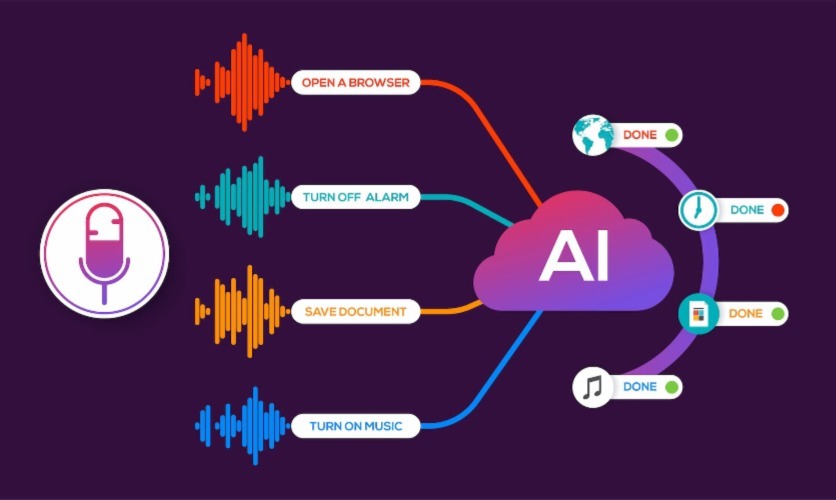April 12, 2023
The rise of voice search has fundamentally changed the way we interact with technology. From Siri to Alexa, voice assistants have become a ubiquitous part of our daily lives. These systems have come a long way since their inception in the 1950s. With more and more people using voice search to find information online, businesses need to adapt their SEO strategies to stay ahead of the curve.
Voice search optimization is no longer an optional add-on to your SEO efforts, but a necessity for any business looking to thrive in the digital age. In this blog, we'll explore the world of voice search optimization and how it can help your business succeed.
What is voice search?
If you’ve ever asked Siri or Alexa to answer a burning question, then you’ve used voice search. Thanks to the spread of smart speakers and voice-activated remote controllers, voice search has become increasingly popular in recent years.
The technology behind voice search allows users to interact with their devices more efficiently, by removing the need for typing, or even pressing any buttons. It works by using speech recognition technology and natural language processing (NLP) to translate commands into text.
How is voice search used?

Voice search can be used for a wide range of tasks, but is most well known for its ability to complete search queries, like “What’s the weather like today?” or “How to bake a cake.”
It can also be used to start navigation, play music, control a smart home, or tasks related to productivity like setting reminders, and even sending emails! Voice assistants can do almost anything one can do on their phone manually.
The technology has recently evolved to become more accurate and responsive, aiding in its popularity. Voice search has become particularly useful for young children, older adults, and people with disabilities who might find it easier to speak than to navigate and type.
What to consider when optimizing for voice search

If you’re looking to optimize your website or online content for search engine optimization (SEO), you’ll also want to consider voice search optimization (VSO). There are several factors that make VSO distinct from traditional SEO rules. By focusing on VSO, a website can become easily discoverable and accessible to voice assistants, generating more organic traffic from folks looking for your content.
To optimize your online content for voice searches, you’ll need to address the following considerations.
Natural language
Voice search queries are made in natural, conversational language, which means they are typically longer and more casual than what a person would type into the search bar! Good VSO means using long-tail keywords and incorporating phrases that match the way people speak.
Mobile-friendliness
Most people use the voice assistant that is already connected to their smartphone, like Siri. It’s important to ensure your website is mobile-friendly so that these mobile-phone voice assistants can quickly and easily load up the relevant pages after a query is made.
Page loading speed
After a voice search is made, most systems prioritize the fastest-loading pages to show to the user. It’s essential to make sure your page loads as quickly as possible so that your website is shown first to searchers.
Local SEO
One of the most common uses of voice search is to find something nearby. Optimizing your online content for local SEO will help your website appear when a user is looking for local businesses and services. To do this, list your business in local directories and include location-based keywords.
The impact of voice search optimization
VSO is a game-changer when it comes to the way users discover and interact with websites. By adapting your website to voice search, you can open up a whole new world of opportunities for reaching and engaging with your audience. With voice search, users are looking for quick, direct answers to their queries, and if your website can provide them, it can greatly increase your chances of appearing in voice search results.
Not to be forgotten is the importance of VSO for accessibility purposes. VSO makes it easier for users with disabilities to navigate and find information online. It’s a win-win!
The future of voice search optimization
VSO is likely to advance by leaps and bounds in the coming years. Voice search assistants will only become more accurate, fast, and personalized with the advancement of Ai technology.
The time to optimize your website for voice search is now!
With the help of Ai, voice search is expected to integrate more closely with visual search, images, and videos. It can already detect individual voices and preferences. The proliferation of Amazon’s Alexa demonstrates just how useful this technology already is, and how integrated it is into our daily lives. Just imagine what it will be able to do one year from today!
Voice search is also becoming more globalized, with increasing pressure to optimize for more languages. This means that businesses and websites that can provide content in multiple languages will have a competitive advantage.
By adapting to the changing landscape of search, you can increase your chances of appearing in voice search results, improve your website's accessibility, and drive more organic traffic to your website’s various pages. If you’re looking to stay ahead of the competition and to create more website traffic, now is the time to add VSO to your SEO strategy.